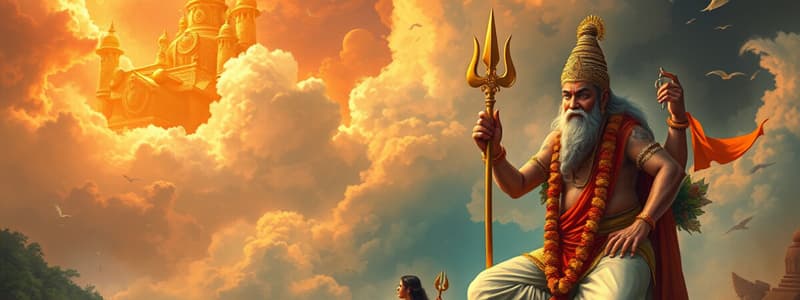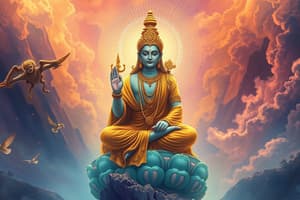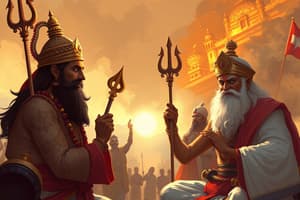Podcast
Questions and Answers
Hindutva thinkers categorize Christianity and Islam as Indic religions.
Hindutva thinkers categorize Christianity and Islam as Indic religions.
False (B)
The term 'Hindutva' was introduced to emphasize the exclusive nature of Hindu identity.
The term 'Hindutva' was introduced to emphasize the exclusive nature of Hindu identity.
False (B)
According to the secular interpretation of Indian history, nationality is based on territoriality rather than religion.
According to the secular interpretation of Indian history, nationality is based on territoriality rather than religion.
True (A)
The introduction of the Western concept of religion led to a recognition of dual religious identity within India.
The introduction of the Western concept of religion led to a recognition of dual religious identity within India.
Hindu nationalists view Hindutva as a subset of Hinduism.
Hindu nationalists view Hindutva as a subset of Hinduism.
Hinduism is primarily characterized by a singular set of creedal formulations similar to Christianity and Islam.
Hinduism is primarily characterized by a singular set of creedal formulations similar to Christianity and Islam.
The ideology of Hindutva is represented by the political party known as the Indian People's Conference.
The ideology of Hindutva is represented by the political party known as the Indian People's Conference.
Hindutva can be described as a political ideology that has a complex relationship with Hinduism as a religion.
Hindutva can be described as a political ideology that has a complex relationship with Hinduism as a religion.
Rashtriya Swayamsevak Sangh, established in 1925, has no significant links to the Bharatiya Janata Party.
Rashtriya Swayamsevak Sangh, established in 1925, has no significant links to the Bharatiya Janata Party.
The exploration of the relationship between Hinduism and Hindutva has diminished significantly since the political rise of the BJP in the 1990s.
The exploration of the relationship between Hinduism and Hindutva has diminished significantly since the political rise of the BJP in the 1990s.
Hinduism is regarded as a plural tradition unlike Christianity and Islam.
Hinduism is regarded as a plural tradition unlike Christianity and Islam.
Hindutva is primarily understood as a religious doctrine rather than a political ideology.
Hindutva is primarily understood as a religious doctrine rather than a political ideology.
The relationship between Hinduism and Hindutva can be compared to that between Islam and Islamic fundamentalism.
The relationship between Hinduism and Hindutva can be compared to that between Islam and Islamic fundamentalism.
Hindu nationalists view Hindutva as a completely separate entity from Hinduism.
Hindu nationalists view Hindutva as a completely separate entity from Hinduism.
The term 'Hindutva' was coined in the early 1900s to promote inclusivity within Hindu beliefs.
The term 'Hindutva' was coined in the early 1900s to promote inclusivity within Hindu beliefs.
Hinduism, Buddhism, Jainism, and Sikhism are categorized as Indic religions due to their shared cultural heritage in India.
Hinduism, Buddhism, Jainism, and Sikhism are categorized as Indic religions due to their shared cultural heritage in India.
The term 'Hindutva' implies that Hinduism must be practiced exclusively and cannot coexist with other religions.
The term 'Hindutva' implies that Hinduism must be practiced exclusively and cannot coexist with other religions.
Followers of Hindutva believe that Hindutva encompasses political ideology but does not fully incorporate the religious dimensions of Hinduism.
Followers of Hindutva believe that Hindutva encompasses political ideology but does not fully incorporate the religious dimensions of Hinduism.
The Indian secular concept of citizenship is based on the territory of India, irrespective of an individual's religious affiliation.
The Indian secular concept of citizenship is based on the territory of India, irrespective of an individual's religious affiliation.
The British census operations in India promoted the idea of a singular religious identity, affecting the perception of religious practices among Indians.
The British census operations in India promoted the idea of a singular religious identity, affecting the perception of religious practices among Indians.
Flashcards are hidden until you start studying
Study Notes
Overview of Hinduism and Hindutva
- Hinduism is the most ancient religion of the Indian subcontinent, characterized by pluralism and a lack of a single, defined creed.
- Hindutva, associated with the BJP and RSS, is a political ideology that advocates for Hindu nationalism.
- The relationship between Hinduism and Hindutva has gained significant attention since the BJP rose to power in 1990, especially after electoral successes in 2014 and 2019.
Distinctions Between Religion and Culture
- A key distinction made by Hindutva advocates is between religions that originated in India (Indic religions) and those that did not, such as Christianity and Islam.
- Hindutva posits that Hinduism should be viewed not only as a religion but as a shared culture, countering the British-imposed concept of exclusive religious identities.
- This perspective underscores the shared tenets of karma, dharma, and cultural practices among Indic religions.
Historical Perspectives on Indian Identity
- Secularism views Indian identity territorially, asserting equality among all citizens irrespective of their religions, framed in the Indian Constitution.
- The Hindutva perspective asserts that Hindus, as original inhabitants, have faced historical oppression by Muslim and Christian rulers, and therefore their political self-assertion is justified.
- This ideological divide complicates the narrative of Indian history, with contrasting views on the impact of coexistence between different religious groups.
Divergence in Historical Interpretation
- Hindu liberals view Muslim and British rule as distinct phases, emphasizing joint struggles for Independence against British exploitation.
- Hindutva historians perceive the history of India as a continuous struggle between Hinduism and Islam, viewing British rule as a lesser concern within this context.
- The legacy of Mahatma Gandhi is also interpreted differently; liberals celebrate his nonviolent resistance, while Hindutva nationalists criticize his perceived appeasement of Muslims.
Caste and Economic Perspectives
- Caste is viewed negatively by liberal historians, deemed to obstruct socio-economic progress; Hindutva ideologues consider it a necessary defense mechanism against historical Muslim challenges.
- There is a paradox regarding India’s economic history: despite a hierarchical caste system, India thrived economically until British rule curtailed its growth.
- The contemporary leadership of the Hindutva movement reflects a shift, with prominent leaders from non-brahmin backgrounds, contrasting with the liberal narrative largely represented by upper castes.
Socio-Cultural Issues
- The cow, a significant symbol in Hindu culture, becomes a polarizing issue between Hindu liberals and Hindutva followers, who take a strong stance on cow protection.
- Language also plays a role in the cultural identity debate, with differing opinions on its significance in defining Hindu nationalism and inclusivity.
Summary of Ideological Battles
- The liberal view prioritizes a secular, pluralistic India, while Hindutva proponents emphasize a homogeneous Hindu identity and its political expression.
- There exists a dynamic and contentious engagement between these ideologies, influencing societal and political discussions in contemporary India.### English Language Dominance in India
- English is spoken by approximately 12% of India's population.
- Hindu liberals view English as a unifying factor and vital for national progress in a globalized environment.
- Hindu nationalists criticize the dominance of English, advocating for the prominence of Indian languages in public life.
Linguistic Diversity and Regional Languages
- India recognizes twenty-two regional languages.
- Hindi is spoken by nearly half of the population and is widely understood, especially in northern and central India.
- Resistance to Hindi imposition is notable in southern India, reflecting regional language pride.
Attitudes Towards Education and Language
- Indian liberals consider a lack of English proficiency as a sign of undereducation.
- Hindu nationalists equate knowledge of only English with undereducation, suggesting a different cultural valuation of languages.
Broader Ideological Differences
- Distinctions exist between Indian liberals and Hindu nationalists regarding views on Jawaharlal Nehru, the Indian Constitution, secularism, and economic policies.
- Both groups engage with Western civilization, opting for selective appropriation rather than outright rejection or acceptance.
Hindu Nationalism vs. Indian Liberalism
- Hindu nationalists advocate for an increased Hindu cultural presence, supporting their viewpoint with the notion that about 80% of the population subscribes to Hinduism.
- Indian liberals express concern that expanding Hindu influence could disrupt India's multicultural and multireligious harmony.
Summary of Interaction with Western Civilization
- India's interaction with the West is characterized by three choices: outright rejection, selective appropriation, and outright acceptance.
- Hindu nationalists and Indian liberals both prefer selective appropriation but differ in the extent of the "Hindu" influence they support.
Overview of Hinduism and Hindutva
- Hinduism is the most ancient religion in the Indian subcontinent, characterized by plurality and cultural richness.
- Hindutva is a political ideology associated with the Hindu right, particularly represented by the Bharatiya Janata Party (BJP) and Rashtriya Swayamsevak Sangh (RSS).
- The rise of the BJP since 1990 has prompted analysis of the relationship between Hinduism and Hindutva, as both share the term "Hindu."
Distinctions Between Religion and Culture
- Hinduism is often viewed as a religion that encompasses both religious and cultural elements, coexisting with other religions in India.
- Hindutva thinkers differentiate between Indic religions (Hinduism, Buddhism, Jainism, Sikhism) that originated in India and religions that did not (Christianity, Islam).
- The British census practices in the 19th century classified these Indic traditions separately, fostering a sense of compartmentalization among them.
The Effect of British Colonialism
- The introduction of the Western concept of exclusive religious identity led to a distinction between religion and culture, which Hindutva ideologues leveraged to unify Indic religions.
- The term “Hindutva” was coined to emphasize the shared culture among Indic religions and to counteract the perceived divisive nature of British classification.
Secular versus Hindu Nationalist Narratives
- Secular narrative views Indian identity as territorial; citizenship is based on birth within India's geography irrespective of religious background.
- Hindu nationalist narrative sees India as primarily a Hindu nation, with claims of historical Hindu oppression during Islamic and British rule.
- The Hindutva perspective calls for political assertion of Hindu identity after centuries of perceived marginalization.
Historical Perspectives
- Liberal historians view Muslims and British colonizers differently, acknowledging shared struggles for Independence while Hindutva historians frame the history as a conflict between Hinduism and Islam.
- Gandhi is revered by liberals as a symbol of nonviolent resistance, while Hindutva supporters criticize him for his perceived appeasement of Muslims, blaming him for the Partition of India.
- Hindutva historians emphasize the militant tradition within Hindu history, contrasting it with the portrayal of Hinduism as pacifist by liberal narratives.
Caste System and Economic Context
- Caste is analyzed through different lenses; liberals focus on its discriminatory aspects while Hindutva supporters may contextualize it as a form of social defense against historical challenges.
- Economic historians note that India was once a leading global economy before British rule, prompting debates about the impact of the caste system on economic development.
Current Leadership Dynamics
- The leadership of the Hindutva movement has evolved; key political figures like Prime Minister Narendra Modi and Party President Amit Shah are non-brahmin leaders, contrasting with earlier brahmin-dominated leadership.
- The cow protection issue serves as a significant point of contention between Hindu liberals and Hindutva supporters, with the latter emphasizing its emotional and cultural importance.
Language and Cultural Identity
- Language plays a crucial role in the discourse surrounding Hindu and Hindutva identities, further complicating the relationship amidst India's linguistic diversity.### English Language in India
- English is used by about 12% of India's population but remains the dominant language.
- Hindu liberals view English positively, seeing it as a unifying factor for India and an asset in global science, technology, and commerce.
- Hindu nationalists challenge the dominance of English, arguing it should be replaced by Indian languages in public life.
Regional Languages and National Identity
- India has twenty-two recognized regional languages, with Hindi spoken by nearly half the population.
- Resistance to Hindi's "imposition" is particularly strong in southern India.
- This linguistic landscape reflects a struggle for national identity and cultural representation post-Independence, with varying attitudes among Indian liberals and Hindu nationalists.
Attitudes Towards Education
- Indian liberals perceive ignorance of English as a sign of undereducation.
- Conversely, Hindu nationalists view proficiency in English, without knowledge of Indian languages, as a mark of undereducation.
Divergent Political and Ideological Views
- Indian liberals and Hindu nationalists disagree on key topics, including views on Jawaharlal Nehru, the Indian Constitution, secularism, economic policy, and religious conversion.
- The ideological divide underscores broader societal tensions between Hinduism and Hindutva.
India's Interaction with Global Civilizations
- Since the 16th century, India has interacted with Western civilizations, presenting three options: outright rejection, selective appropriation, or outright acceptance.
- Both camps reject outright rejection and acceptance, opting instead for selective appropriation.
- Hindu nationalists advocate for a greater emphasis on Hindu cultural elements in this appropriation.
Cultural Balance and Secularism
- There is concern among Hindu and Indian liberals that an expanded Hindu influence may disrupt India's delicate balance of multiculturalism, multilingualism, and multi-religiosity.
- Approximately 80% of India's population adheres to Hinduism, impacting national identity and policies.
Historical Context
- The discussion is set against a backdrop of India's historical experience with colonialism and ongoing globalization.
Conclusion on Ideological Differences
- The differences between Hindu liberals and Hindu nationalists represent a significant dialogue about the future of India's identity, language, and culture in a global context.
Studying That Suits You
Use AI to generate personalized quizzes and flashcards to suit your learning preferences.




